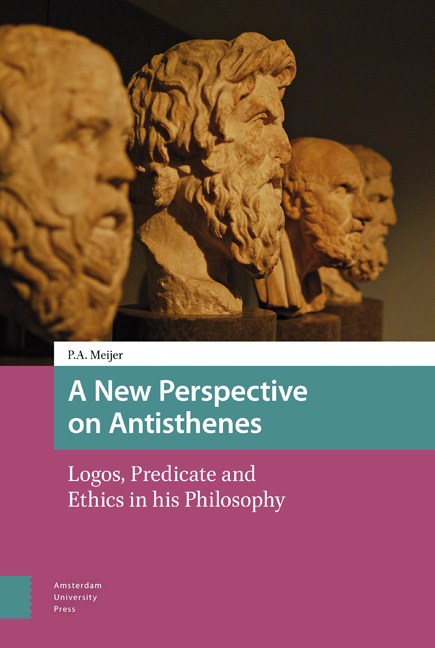Book contents
- Frontmatter
- Dedication
- Contents
- Preface
- Abbreviations
- Primary Sources – Editions Used
- Introduction
- Part I LOGOS AND PREDICATE
- Part II ANTISTHENES’ VIEWS ON THEOLOGY: HIS THEORETICAL APPROACH TO THE STUDY OF HOMER
- Part III ANTISTHENEAN ETHICS
- Epilogue: Antisthenes, an Assessment
- Appendix II The Speeches of Ajax and Odysseus
- Bibliography
- Concordance Giannantoni (SSR) – Caizzi (D.C.)
- Index
Chapter V - Antisthenes and Politics
Published online by Cambridge University Press: 24 December 2020
- Frontmatter
- Dedication
- Contents
- Preface
- Abbreviations
- Primary Sources – Editions Used
- Introduction
- Part I LOGOS AND PREDICATE
- Part II ANTISTHENES’ VIEWS ON THEOLOGY: HIS THEORETICAL APPROACH TO THE STUDY OF HOMER
- Part III ANTISTHENEAN ETHICS
- Epilogue: Antisthenes, an Assessment
- Appendix II The Speeches of Ajax and Odysseus
- Bibliography
- Concordance Giannantoni (SSR) – Caizzi (D.C.)
- Index
Summary
Introduction
The only fragment of an Antisthenean work entitled Politikos tells us ‘that his [sc. Antisthenes] dialogue Politikos contained an attack on all the demagogues at Athens’. Note that this is not a condemnation of democracy, only of the demagogues. It is plausible that Alcibiades was also attacked in this work, or in any case included in it, because the verdict on him must have been rather severe due to the moral disapproval of him (as stated already).
Antisthenes’ own attitude can be characterized as taking the middle course. In the personal domain he advised against coming too close to politics, but he did not advise abstaining from it either. Just as one must not come too close to fire with the risk of being burned, so too one must not be too far from the fire with the risk of getting cold. He seems to have had no preference for any particular form of constitution, be it oligarchic or democratic, only for the right kind of monarchy. He was a citizen of Athens, a democracy, and we do not know of any extended stay in another country. As a citizen he participated in the battle of Tanagra (426 B.C.) and distinguished himself, thus creating for Socrates the opportunity to make a humorous remark, something in the vein of ‘if both Antisthenes’ parents had been Athenians he would not have turned out to be so brave’.
In the theoretical field he had something positive to say about those who are individually outstanding to such a degree that they are entitled to lay claim to absolute power. We have a suggestion by Antisthenes referring to lions and hares at a human congress (!) requiring all of them to be equal. Obviously we are in the realm of fable. The congress of the lions and the hares appears in Aristotle's Politics, where Antisthenes is introduced in a discussion on the superior man, who is like a god, and for whom there can be no legislation. Aesop's fable 241 provides the only clue for interpretation, but there the lions say to the hares: ‘Where are your claws and teeth?’ In other words, ‘We did the job, so we have claim to a greater share’.
- Type
- Chapter
- Information
- A New Perspective on AntisthenesLogos, Predicate and Ethics in his Philosophy, pp. 128 - 139Publisher: Amsterdam University PressPrint publication year: 2017



